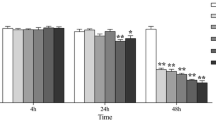Abstract.
We have shown previously that the human intestinal protozoan, Blastocystis hominis, undergoes apoptosis-like programmed cell death (PCD) when exposed to a cytotoxic monoclonal antibody (mAb), 1D5. In the present study, ELISA and immunoblot assays employing chicken anti-CPP32 antibody suggest that caspase-3-like antigens exist in B. hominis. Using colorimetric and flow cytometric assays for caspase-3 activity, we also observed an increase in activity between 1 h and 6 h after exposure to mAb 1D5, with greatest activity at 6 h. These findings suggest that caspase-3-like proteases play an important role in B. hominis undergoing PCD, similar to the phenomenon in higher eukaryotic organisms.
Similar content being viewed by others
Author information
Authors and Affiliations
Additional information
Electronic Publication
Rights and permissions
About this article
Cite this article
Nasirudeen, .A., Singh, .M., Yap, .E. et al. Blastocystis hominis: evidence for caspase-3-like activity in cells undergoing programmed cell death. Parasitol Res 87, 559–565 (2001). https://doi.org/10.1007/s004360100427
Received:
Accepted:
Issue Date:
DOI: https://doi.org/10.1007/s004360100427




